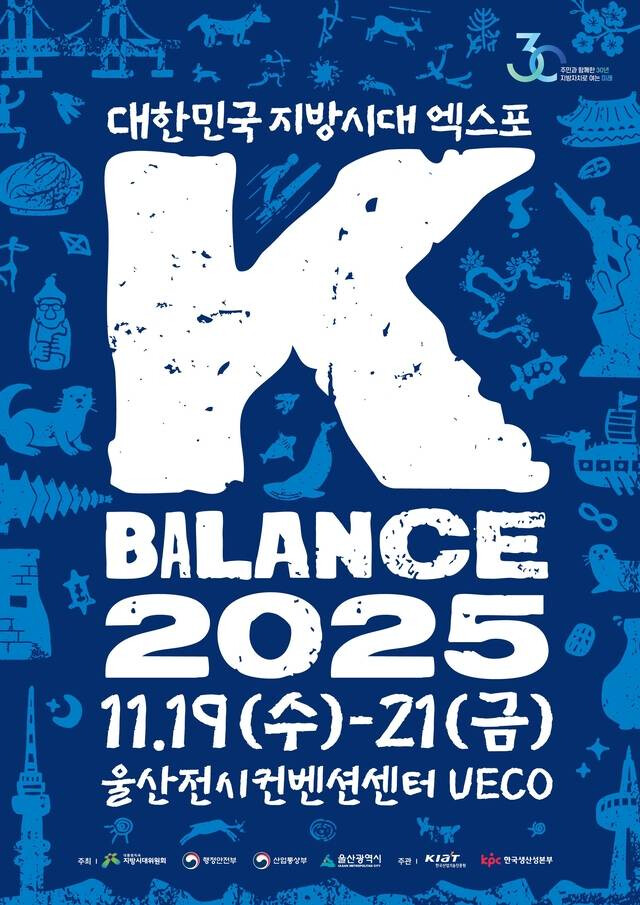
Ulsan, South Korea – The '2025 Era of Localism Expo,' a major event dedicated to discussing balanced growth and sustainable future policies, commenced today in Ulsan. The three-day event, held at the Ulsan Exhibition and Convention Center (UECO), gathers key stakeholders to present the future direction for South Korea's national development under the theme "K-BALANCE 2025."
Jointly hosted by the Presidential Committee for the Era of Localism, the Ministry of the Interior and Safety, the Ministry of Trade, Industry and Energy, and Ulsan Metropolitan City, the expo features the participation of 47 organizations, including 17 metropolitan cities and provinces, their respective offices of education, central government ministries, and public institutions.
Focus on Strategy and Collaboration
The expo opened this afternoon with the '3rd Commemoration Ceremony of the Day of Local Autonomy and Balanced Development,' attended by approximately 400 dignitaries, including Prime Minister Kim Min-seok, Chairman of the Presidential Committee for the Era of Localism Kim Gyeong-soo, Minister of the Interior and Safety Yun Ho-jung, and Ulsan Mayor Kim Doo-gyum.
The core of the event is a comprehensive exhibition showcasing national balanced growth strategies and regional policies, complemented by 28 policy and academic conferences focusing on Balanced Growth (9 sessions), Autonomy and Decentralization (11 sessions), Regional Revitalization (5 sessions), and National Tasks (3 sessions). These sessions take the form of seminars, academic conferences, best practice competitions, and talk concerts.
The exhibition area is massive, comprising 336 booths across several halls, including the Era of Localism Hall, Host City Hall, Ministry Hall, City/Provincial Hall, and Local Autonomy 30th Anniversary Hall.
Ulsan: The AI Hub and Industrial Heritage
A central feature is the Ulsan Hall, dedicated to the host city. Ulsan, historically the heart of South Korea's industrial growth since its designation as a special industrial district in 1962, is now positioning itself for a new leap forward. Under the theme, 'The Artificial Intelligence (AI) Capital of South Korea,' the hall showcases Ulsan’s plan to transform beyond its status as an industrial capital, leveraging over 60 years of manufacturing field data and a new AI data center. The hall also highlights current projects and challenges related to mega-regional cooperation, such as the Busan-Ulsan-Gyeongnam Economic Alliance and the Haeoreum Alliance.
Other halls provide comprehensive views:
Era of Localism Hall: Exhibits the "Five Poles, Three Special Zones" balanced growth strategy and successful regional development models.
City/Provincial Hall: Presents spatial connection and integration models across the "Five Poles, Three Special Zones" to demonstrate cooperative and co-prosperity models for super-regional areas.
City/Provincial Office of Education Hall: Features excellent examples of region-specific education policies and their key achievements.
Experiencing Ulsan
To allow attendees to experience the host city's unique assets, Ulsan City is operating industrial and cultural tourism programs on the 20th and 21st. The Industrial Site Tour offers visits to major companies like SK Energy, S-Oil, Hyundai Motor Company, and HD Hyundai Heavy Industries. The Culture and Tourism Tour includes stops at the Bangudae Petroglyphs and the Taehwa River National Garden.
Furthermore, the expo features the Ulsan Story Yard, which includes experiential and sales events showcasing local characteristics, performances by young artists, and food trucks. An 'Ulsan Sports Challenge' allows visitors to try out activities like football and basketball.
Ulsan Mayor Kim Doo-gyum remarked, "Through the 2025 Era of Localism Expo, held on the 30th anniversary of the implementation of local self-government, we will widely publicize our history of developing into a symbolic city of local autonomy where industry, environment, and culture are harmoniously blended." The expo is set to provide a vital platform for shaping the nation's future development strategy.
[Copyright (c) Global Economic Times. All Rights Reserved.]




























